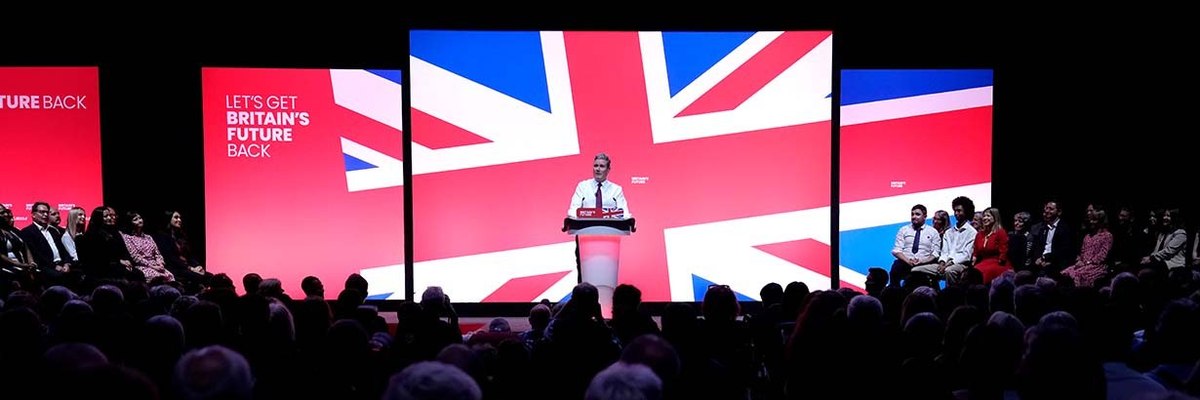A quarter of Labour voters already say they have an unfavourable view of the party, with the attribute the public are most likely to give Labour being ‘dishonest’
Fresh from Reform UK’s conference in Birmingham, attention has now turned to Labour’s in Liverpool, which may prove to be a display of mixed emotions. On the one hand, there’s cause for celebration – just two-and-a-half months ago Labour took power in a landslide election. But on the other, the party has emphasised the difficult economic circumstances they have inherited, with the government’s already sinking approval ratings unlikely to go unnoticed.
In the aftermath of that landslide victory, Britons were fairly evenly divided on how they viewed Labour – nearly half (47%) said they had a favourable opinion of the party, while a similar number (46%) said they saw the party unfavourably.
Now, less than three months on, only one in three Britons (34%) say they have a positive opinion of the party, while a clear majority (57%) view Labour negatively.
Central to this swing against Labour is their own voters turning on them. Nearly a quarter of those who voted Labour in July (23%) already describe their opinion of the party as unfavourable, including one in eleven (9%) going as far as describing their attitude towards the governing party as very unfavourable.
Of course, against this, is the fact that three quarters of Labour voters (73%) still see the party in a good light, but this is a clear reduction from the near-unanimously positive view among them after the election (94%) and includes the number of Labour voters with a ‘very’ favourable view of their choice falling from 35% to 15%.
Lib Dem voters have also become less enamoured with Labour. Only half of Lib Dems (49%) now describe their view of Labour as positive, down from two-thirds (66%) after the election, while the proportion of Lib Dems with an unfavourable opinion of the governing party has risen from 29% to 46%.
Nine in ten Conservative and Reform UK voters (88-89%) have an unfavourable view of Keir Starmer’s party, the same as in July.
How do Britons see the Labour Party?
Part of the reason for this clear negativity towards a party that was able to secure a landslide majority mere months ago can be seen in how the public think about Labour.
When asked which of a set of common political descriptors applied to Labour, Britons are most likely to choose ‘dishonest’, which is selected by 36% of the public and, perhaps more notably, 14% of those who voted Labour in July. The idea that Labour are just ‘only interested in themselves’, and ‘the same as the rest’ are felt by three in ten Britons (31%), including more than one in five Labour voters (22%) in the case of the latter statement. A quarter of Britons (27%) also feel that Labour ‘has unworkable policies’ and ‘should not be near power’.
Not everybody has such a poor opinion of the party. Just over one in five Britons (22%) and half of Labour voters (47%) see ‘interested in public service’ as an appropriate description for Labour, with 19% of the public also seeing them as ‘fit to govern’. Additionally, more Britons feel Labour ‘seem like normal people’ (16%) than think they are ‘weird’ (6%).
Who do Britons think Labour care about?
Another core aspect of Labour’s image problem is that only around one in four Britons (23%) see them as caring about ‘people like them’, against two-thirds of the public (65%) who see the party of government as not bothered by their interests. Most concerningly for Labour, only half of people who voted for them in this year’s election (50%) see the party as caring about them, while 37% of their own voters feel Labour are not invested in people like them.
Similar issues apply across several wider social groups. Two-thirds of Britons (67%) see Labour as not caring about older people, with this rising to over eight in ten (84%) among those aged 65 and over. Labour are also perceived as being distant from homeowners, with only 28% of Britons seeing the government as caring about them, against a majority (54%) who feel Labour don’t care.
Despite their historic association with working people, Britons today are just as likely to view Labour as caring about rich people as the working class, with four in ten (41%) seeing Labour as being invested in both groups. Plus, the continued association with workers that does linger appears to be disproportionately in the minds of the middle class – 49% of those living in ‘ABC1’ (i.e. middle class) households view Labour as caring about the working class, compared to just 29% of those in ‘C2DE’ (working class) households.
Similarly, Labour’s historic links with those in the North also appear to be weakening. Half of northerners (54%) see Labour as caring about people in the South of England, while just three in ten (29%) see the party as being bothered by those outside the South, a view shared by just one in five Scots (20%).
Labour are most likely to be seen as close to trade unions and immigrants, which around six in ten Britons (59-63%) see the party as caring about, while a majority of the public (54%) also see Labour as a party invested in ethnic minorities. And, while Britons as a whole are divided 40% to 42% on whether or not Labour cares about young people, 18-24 year olds tend to see Labour as being aligned with their interests, with nearly half (47%) saying Labour do care about younger Britons, against a third (35%) who disagree.
How do you feel about the Labour Party, other political parties, and everything else? Have your say, join the YouGov panel, and get paid to share your thoughts. Sign up here.
Photo: Getty






